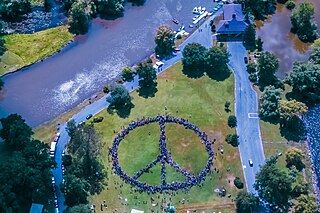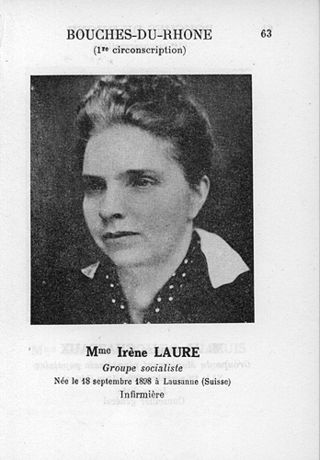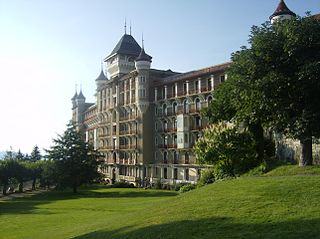
Moral Re-Armament (MRA) was an international moral and spiritual movement that, in 1938, developed from American minister Frank Buchman's Oxford Group. Buchman headed MRA for 23 years until his death in 1961. In 2001, the movement was renamed Initiatives of Change.
The Oxford Group was a Christian organization founded by American Lutheran minister Frank Buchman in 1921. Buchman believed that fear and selfishness were the root of all problems. He also believed that the solution to living without fear and selfishness was to "surrender one's life over to God's plan". It featured surrender to Jesus Christ by sharing with others how lives had been changed in the pursuit of four moral absolutes: honesty, purity, unselfishness, and love.

Stockholm International Peace Research Institute (SIPRI) is an international institute based in Stockholm. It was founded in 1966 and provides data, analysis and recommendations for armed conflict, military expenditure and arms trade as well as disarmament and arms control. The research is based on open sources and is directed to decision-makers, researchers, media and the interested public.

Franklin Nathaniel Daniel Buchman, best known as Frank Buchman, was an American Lutheran who founded the First Century Christian Fellowship in 1921, renamed as the Oxford Group in 1928, that was transformed under his leadership in 1938 into the Moral Re-Armament and became Initiatives of Change in 2001. As a leader of the Moral Re-Armament, he was decorated by the French and German governments for his contributions to Franco-German reconciliation following the end of World War II.
The Centre for Democracy and Development (CDD) is a non-profit organization headquartered in Abuja, Nigeria. The organization aims to promote the values of democracy, peace and human rights in Africa, particularly in the West African sub-region.

Peacebuilding is an activity that aims to resolve injustice in nonviolent ways and to transform the cultural and structural conditions that generate deadly or destructive conflict. It revolves around developing constructive personal, group, and political relationships across ethnic, religious, class, national, and racial boundaries. The process includes violence prevention; conflict management, resolution, or transformation; and post-conflict reconciliation or trauma healing before, during, and after any given case of violence.
Peter Dunsmore Howard was a British journalist, playwright, captain of the England national rugby union team and leader of Moral Re-Armament from 1961 to 1965. He also won a World Championship bobsleigh medal in 1939.

Caux (Montreux) is a small village in the Canton of Vaud, Switzerland which is part of the Montreux municipality. It looks out over Lake Geneva from an altitude of 1000 meters.

Cornelio Sommaruga was a Swiss humanitarian, lawyer and diplomat who is best known for having been President of the International Committee of the Red Cross (ICRC) from 1987 to 1999. He chaired the Geneva International Centre for Humanitarian Demining (GICHD) in Geneva. He was also active on a number of boards, such as the International Union Against Cancer. He was Chair of the Board of Directors of the Foundation For the Future, an organization dedicated to promoting human rights in the Middle East and North Africa, and the honorary President of Initiatives of Change International, a global organization dedicated to "building trust across the world's divides" of culture, nationality, belief, and background.

The Elders is an international non-governmental organisation of public figures noted as senior statesmen, peace activists and human rights advocates, who were brought together by Nelson Mandela in 2007. They describe themselves as "independent global leaders working together for peace, justice, human rights and a sustainable planet". The goal Mandela set for The Elders was to use their "almost 1,000 years of collective experience" to work on solutions for seemingly insurmountable problems such as climate change, HIV/AIDS, and poverty, as well as to "use their political independence to help resolve some of the world's most intractable conflicts".
Hekmat Khalil Karzai is the deputy foreign minister of Afghanistan. He was appointed as the deputy foreign minister on 21 January 2015.

Béla Hatvany is a pioneer in the automation of libraries and the information industry. Companies founded by him have been responsible for the first Online Public Access Catalog (OPAC), the first CD-ROMs, the first networked CD-ROM, the first client-server library databases, and some of the earliest internet library database retrieval engines. In addition, he was a key investor in the first streaming music databases for libraries (Classical.com), and online ready references for libraries. He is recognized as a visionary in library information.

The International Anti-Corruption Conference (IACC) is a series of international conferences organised by the IACC Council, in association with local governments and organisations, with Transparency International as its secretariat. The conference was first held in 1983 in Washington D.C. and has since been held every two years in a different country.

Mohamed Sahnoun was an Algerian diplomat who served as ambassador of Algeria to West Germany, France, the United States, and Morocco as well as permanent representative of Algeria to the United Nations. He also served as the Organisation of African Unity's Assistant Secretary General, the Arab League's Assistant Secretary-general, the Secretary-General of the United Nations's Special Representative for Somalia in 1992 and the Secretary-General of the United Nations's Special Representative for the Great Lakes region of Africa in 1997 before continuing to work for peace and reconciliation through various UN-related or independent charities. He particularly focused on developing intercultural and inter-religious dialogues and on healing wounded memories from past conflicts.
Samuel Gbaydee Doe is a conflict, peace, and development professional from Liberia. Doe was a cofounder, with Emmanuel Bombande, of the West Africa Network for Peacebuilding (WANEP), based in Accra, Ghana. This organization focuses on collaborative approaches to conflict prevention and was founded in 1998 in response to the civil wars taking place in West Africa. The organization is known for their work with several regional partners such as the Economic Community of West African States (ECOWAS) and the African Union’s Economic, Social, and Cultural Council (ECOSOCC).

Irène Laure was a French socialist activist and politician, a member of the French Resistance and an MP in the 1945 parliament. She became known from 1947 onwards as she led a campaign of several months duration through Germany to ask for forgiveness and to foster French-German reconciliation.

The Caux Palace Hotel is a former palace hotel located in the village of Caux, in the city of Montreux in the Vaud canton, in Switzerland.
Philippe Mottu was a Swiss diplomat, author and activist born on 9 October 1913 in Geneva; he died in Lonay (Vaud) on 23 August 2010. In 1946, inspired by the American Frank Buchman, he was instrumental in the acquisition of the former Caux Palace Hotel, a dilapidated hotel above Montreux, Switzerland, by a group of about 100 Swiss, in order to create an international conference centre at the service of European reconciliation and reconstruction. He wrote a dozen books of political and social philosophy.

Lennart Rafael Segerstråle was a Swedish-speaking Finnish painter and graphic artist. He was best known for his murals and frescoes.

William Frederick Nkomo (1915–1972) was a South African medical doctor, community leader, political activist and teacher from Pretoria. He was the founding chairman of the African National Congress Youth League. While at the University of the Witwatersrand, Nkomo was the first black student to serve on the Students Representative Committee.















